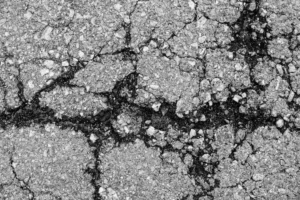Are you tired of constantly repairing your asphalt paving every few years, while your neighbors with concrete driveways enjoy a longer lifespan without any hassle? Well, fret no more! In this article, we will provide you with essential tips and tricks to maximize the lifespan and maintain your asphalt paving.
From identifying signs of damage to implementing preventive measures, we’ve got you covered. So, sit back, relax, and let us guide you through the world of asphalt maintenance.
Factors Affecting the Lifespan of Asphalt Paving
If you neglect to address potholes and cracks promptly, heavy trucks, cars, water saturation, exposure to moisture, and harsh storms will contribute to the damage to your asphalt paving. These are common causes of asphalt damage that can significantly reduce its lifespan.
However, there are cost-effective solutions to mitigate these factors and prolong the durability of your asphalt pavement. Regular maintenance such as seal coating and crack sealing can prevent water penetration and protect your pavement from moisture damage.
Additionally, implementing proper drainage systems and redirecting heavy traffic can help minimize the impact on your asphalt surface.
Signs of Asphalt Damage and Deterioration
Inspect your driveway regularly for signs of damage and deterioration, such as cracks, potholes, and water pooling. Identifying these issues early can help prevent further damage and costly repairs.
Common causes of asphalt deterioration include heavy trucks, cars, water saturation, and exposure to moisture. Harsh storms and overgrown tree roots can also contribute to the deterioration of your asphalt.
To prevent asphalt damage, it’s important to keep sprinklers and watering hoses away from your driveway to avoid water saturation. Additionally, removing old trees near your driveway can prevent root damage.
Addressing potholes and cracks promptly can also help maintain the integrity of your asphalt.
Essential Maintenance Practices for Asphalt Paving
To ensure the longevity of your asphalt, regularly clean debris and remove stains using a mild detergent and water. Preventive measures for asphalt longevity include:
- Regular cleaning: Sweep away leaves, dirt, and other debris to prevent them from accumulating and causing damage.
- Sealcoating: Apply a protective layer of sealant every few years to protect against UV rays, water penetration, and other elements.
- Fill cracks and potholes: Promptly repair any cracks or potholes to prevent water from seeping in and causing further damage.
- Proper drainage: Ensure that your asphalt has adequate drainage to prevent water from pooling and causing deterioration.
- Avoid heavy loads: Minimize the use of heavy trucks and vehicles on your asphalt, as they can cause excessive stress and damage.
Common causes of asphalt deterioration include heavy trucks, water saturation, exposure to moisture, and overgrown tree roots. By following these preventive measures, you can extend the lifespan of your asphalt and save on costly repairs in the long run.
Preventive Measures to Extend the Lifespan of Asphalt
Regularly cleaning debris and promptly addressing cracks and potholes are essential preventive measures that can help you extend the lifespan of your asphalt.
In addition to these practices, there are two other important factors to consider: sealing techniques and proper drainage.
Sealing your asphalt pavement is crucial in protecting it from the damaging effects of water, UV rays, and other external elements. By applying a high-quality sealant, you create a protective barrier that prevents moisture penetration and slows down the deterioration process.
It is recommended to seal your asphalt every 2-3 years, or as needed based on the condition of your pavement.
Proper drainage is also crucial in maintaining the longevity of your asphalt.
Without proper drainage, water can accumulate on the surface, leading to accelerated deterioration and the formation of potholes.
Installing and maintaining a drainage system, such as catch basins and French drains, can help redirect water away from your asphalt, preventing potential damage.
Repairing Potholes and Cracks in Asphalt Driveways
When addressing potholes and cracks in your asphalt driveway, it’s important to promptly fill them to prevent further damage. Here are some key points to consider:
Best materials for pothole repair:
- Asphalt cold patch, hot mix asphalt, asphalt emulsion.
DIY vs. professional crack repair:
- DIY options include asphalt crack filler, sealant, or patching compound. Professional repairs may involve specialized equipment and techniques for long-lasting results.
- DIY repairs can be cost-effective, but may not provide long-term solutions for larger or deeper cracks.
- Professional crack repair ensures proper preparation and application, resulting in more durable repairs.
- Factors to consider when deciding between DIY and professional repair include the size and severity of the cracks, your budget, and your time constraints.
Professional Tips and Tricks for Asphalt Paving Maintenance
In order to maintain the longevity and durability of your asphalt driveway, it is crucial to take proactive measures to prevent water damage.
Sealing asphalt is a highly recommended step to protect your pavement from moisture infiltration, which can lead to cracking, potholes, and deterioration.
By applying a high-quality asphalt sealer, you create a protective barrier that prevents water from seeping into the pavement and causing damage.
To further prevent water damage, it is important to ensure proper drainage around your asphalt driveway.
This can be achieved by installing a suitable slope or using drainage systems to divert water away from the pavement.
Regularly inspecting and addressing any cracks or potholes promptly is also essential in preventing water from penetrating the asphalt surface.
Conclusion
Ensuring the longevity of your asphalt pavement requires proactive maintenance measures. Promptly addressing issues like cracks and potholes, implementing proper drainage, and applying regular seal coating are crucial steps to protect against factors like water penetration, UV rays, and heavy traffic.
By taking these preventive actions, you can extend the lifespan of your asphalt and minimize the need for costly repairs in the future. Remember, a well-maintained asphalt surface not only enhances its durability but also contributes to the overall curb appeal of your property.



